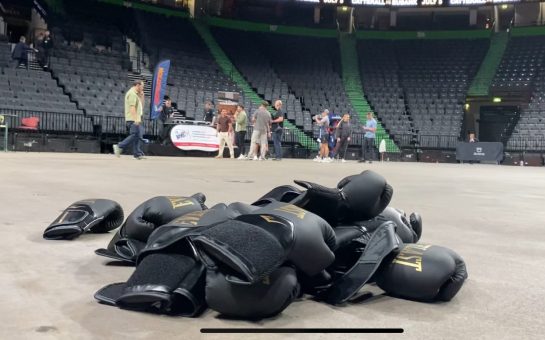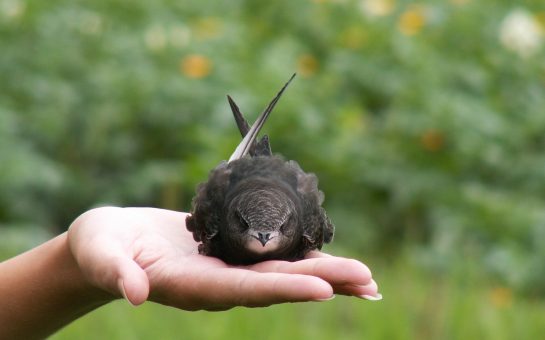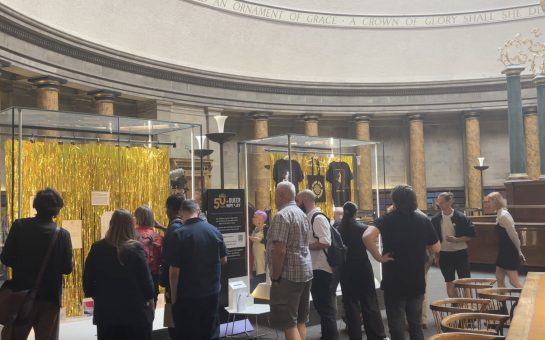To celebrate LGBT History Month, MM talk to LGBT figures from across Greater Manchester about their experiences of coming out and what progress they think the city still has to make towards equality.
Yesterday we heard from gay barber and rugby player for Canalsiders ARLFC on the difficulties of finding acceptance outside the LGBT community.
Next up is Charlie Hooson-Sykes, an executive assistant at the University of Manchester, where she has worked since 2002.
The oldest of four, Charlie and her family moved to Manchester in 1989 and she met and married a local Prestwich boy in 2007.
Outside the ‘day’ job she writes for a number of publications and websites on a diverse range of subjects, from supper clubs to graphene.
She also has her own blog and is, in her own words, ‘terminally curious’ and wants to know, do and see everything and insists on ‘trying everything twice, just to see if she likes it’.
I asked for a pic of my *hair*…. pic.twitter.com/XpnkKZvj1S
— Charlie (@The_Lady_Sybil) December 7, 2014
How old were you when you first realised you were L/G/B or T?
Probably around 15 or 16. I’d never really thought about it before, I was in an all girls’ school, where fear of lesbianism was rampant.
Looking back, it’s ridiculous and part of it was probably a form of mass hysteria. Like it was catching or something.
What’s depressing is that it’s not that long ago. And I don’t think things in same sex schools have probably changed that much.
Could you tell us your ‘coming out’ story?
It’s very anticlimactic. I decided at 21/22 and just out of a six year relationship (I know), that I had to tell my parents.
I built it up in my head, even though I knew my parents were going to be fine about it, as was the rest of my family, it still felt like a really big thing. Something scary.
I went to speak to my mum first, knowing full well she’d inform everyone for me. And she was a little less scary than my dad, we had a very close relationship.
Her response was ‘we know’. As was the response of just about everyone else. I wish someone had maybe told me?
From coming out to now, what are lessons you have learnt about yourself with regards to you and your sexuality?
It’s still a learning process. I’ve learned I don’t see genders particularly, I see people, a person. I never make assumptions about a person or their preferences. Oh and my gaydar is terrible.
I’ve learned to be open about my sexuality – I’ll happily speak to anyone about it, and am active in being supportive of the LGBT community, but I don’t feel it necessary to shout it from the rooftops, or make a big deal out of it. I am who I am.
What are the biggest challenges still to overcome in the UK for the LGBT community?
From the bisexual perspective, there’s still a lot of ambiguity around what bisexual is and I think others struggle with this.
Love this dress – thank you @teamLBD #HowIwearmyLBD pic.twitter.com/4AA8u2Z5gX
— Charlie (@The_Lady_Sybil) November 23, 2014
I have a clear idea in my head what it means to me, but others may view it differently and feel differently.
Dealing with emotions and ideas and identity is always going to be an emotive subject and will provoke different reactions. Being accepting of people and their views is always going to be a challenge.
I still now know people who are gay and some who are straight, who see my label as a choice, not a way of being. I’d love that to disappear, but I’m not sure it will.
And what about for the rest of the world?
They are vast issues. Homophobia is still everywhere, transphobia is still everywhere, then there are issues around equality for everyone – whether that’s men, women or children, the LGBT or straight community equal should mean equal.
I know the world won’t ever be a 100% happy place, I’m a realist, I know that we need negatives in order to have positives, but I’m still going to shout about things that are fundamentally wrong.
What would you say to your young self or a young LGBT person with the knowledge you have now about coming out?
Do it. You’ll feel so much better, so much freer. Even if you know it’ll be accepted, there’ll still be that niggle of doubt. Quash it and be open about who you are.
More importantly, you’ll respect yourself more and that’s a big thing. Respect yourself, love yourself and you’ll make it easy for people to love you too.
How does being gay impact on your job/career?
Luckily, it doesn’t. We have a great LGBT network here at the University of Manchester, and our policies are well publicised.
We’re also in the top 50 employers on the Stonewall Workplace Equality Index and have a great source of support for all staff, in our Counselling Service, mentoring programme, and the relatively new Report & Support system for reporting incidents of harassment.
What are your thoughts on Manchester’s LGBT scene? Is the Village still the heart of it in your mind?
I think the Village will always be a part of the LGBT scene. It’s synonymous with it.
But I love the idea that everywhere is accepting now, that thought the Village is the ‘scene’, straight couples can drink and dine there, and gay couples can head anywhere and make PDAs without it being frowned upon, or looked at disparagingly. People in love, are people in love.
Just for @deadlyfemale #deadlyisthefemale – my favourite dress with an apt background… ;o) pic.twitter.com/f8ofA6Fs8I
— Charlie (@The_Lady_Sybil) November 21, 2014
Conversely, I’m concerned with the idea of restricting access to people in some venues in the Village – I’ve not had experience of it and yes, I can understand the reasons why people would feel that they need to do it, but I always felt that the Village was accepting of you, whatever you are.
I don’t look like I belong under any label particularly. How can someone define who is ‘straight’ and who is ‘gay’. It’s not as if people tend to wear badges defining who they are.
What makes Manchester a good place to live in for members of the LGBT community?
The people. Whoever you are, you can talk to anyone – maybe I have one of those faces, people feel they can just talk to me – but I can have a conversation with someone on a bus, in a shop queue, in a bar or restaurant.
Whatever you look like, it doesn’t matter, there’s no judgement, you’re taken as you are.
There’s an innate friendliness that I find often baffles friends who move here from elsewhere. It’s something I never take for granted.



